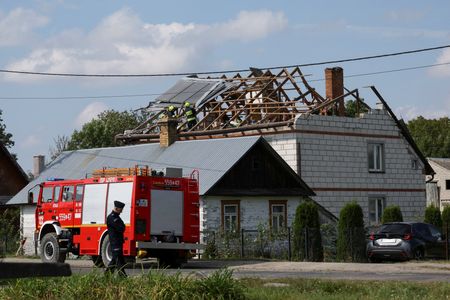By Lisa Barrington and Joanna Plucinska
SEOUL/FRANKFURT (Reuters) -The incursion of Russian drones in Poland has reignited safety concerns over the vulnerability of civil air transport in Europe, aviation and insurance experts said, the latest upheaval facing airlines from escalating global conflict.
Early on Wednesday, Poland shot down drones in its airspace with the backing of military aircraft from its NATO allies, the first time a member of the Western military alliance is known to have fired shots during Russia’s war in Ukraine.
Warsaw Chopin and Modlin airports, as well as Rzeszow and Lublin airports in the country’s east, temporarily closed before resuming operations.
Countries bordering on Ukraine have reported occasional Russian missiles or drones entering their airspace since Russia’s 2022 invasion, but not on such a large scale, and they are not known to have shot them down.
AIRLINES LEFT WITH FEWER OPTIONS, HIGHER COSTS
Proliferating conflict zones around the world have increased the burden on airline operations and profitability, adding to safety concerns and disrupting travel.
With airspace closures around Russia and Ukraine, throughout the Middle East, between India and Pakistan, and in parts of Africa, airlines are left with fewer route options.
Detours add to airlines’ fuel costs and lengthen journey times. Eurocontrol, a 41-nation coordination agency, has said Ukraine’s closed airspace has added to congestion in the region’s skies.
Since October 2023, many international carriers have suspended flights to the region due to fears of missile and drone interference.
Wednesday’s drone incident followed Israel’s attempt on Tuesday to kill the political leaders of Hamas in the Qatari capital Doha.
Worries about further disruption for the travel industry pressured airline stocks. Shares in British Airways owner IAG were down 4.1%, easyJet fell 2.2% to its weakest since April, while Lufthansa and Ryanair were both also 2.2% lower at the close of trade.
Flight disruptions were relatively limited because the drone incursion happened early in the morning, before many airlines had started flying.
Polish airline LOT redirected some flights to western Poland and said it expected cancellations and delays.
A spokesperson for budget airline Wizz Air, which operates in central and eastern Europe, said its security teams “closely monitored” the situation and adjusted flight schedules after airports closed.
The European Union Aviation Safety Agency said no advisory was needed for the drone incursion due to its temporary nature, adding that Poland’s aviation authorities were able to sufficiently handle the incident.
AIRLINES, INSURERS EYE RISKS
Aviation analysts say airlines are increasingly wary of the risks posed by incursions into civilian flight zones.
“This is a wake-up call, I think, for everyone in Europe that can expect this more often,” said Eric Schouten, head of security consultancy Dyami.
Two senior aviation insurance market sources said the market was watching events in Poland and Qatar closely.
If the market got a sense either that Russian drone incursions into Polish airspace were becoming consistent and deliberate, or that Israeli airstrikes in the Middle East were likely to continue, it would pose serious questions for insurers, one source added.
LOT, Lufthansa, Ryanair, and airBaltic did not immediately respond to requests for comment.
Poland’s civil aviation authority and air navigation service did not respond to a request for comment on additional measures taken to ensure airspace safety.
WORST-CASE SCENARIO
Following the drone incident, airlines may review their risk assessments in Poland, said Matthew Borie, chief intelligence officer at aviation risk consultancy Osprey Flight Solutions.
They may consider flying further west in Poland away from the Russian, Ukrainian, and Belarusian borders, operating during daylight hours and carrying extra fuel to cope with potential diversions, he said, similar to steps taken in the Middle East.
The worst-case scenario for airlines flying near a conflict zone is a plane being struck — either accidentally or deliberately — by weaponry.
Since 2001, six commercial planes have been unintentionally shot down, with three additional close calls, according to Osprey.
In one such incident, in December, an Azerbaijan Airlines flight crashed in Kazakhstan, killing 38 people. The plane was accidentally shot down by Russian air defences, according to Azerbaijan’s president and Reuters sources.
In 2020, a Ukrainian passenger plane was mistakenly targeted and destroyed by Iranian air defence operators.
“If this happens more often, you really have to understand what’s happening … What might go wrong? I’m always saying, misidentification is your biggest risk,” Schouten added.
(Reporting by Joanna Plucinska in Frankfurt and Lisa Barrington in Seoul;Additional reporting by Michael Jones from The Insurer;Writing by Joanna Plucinska;Editing by Josephine Mason, Rod Nickel)









